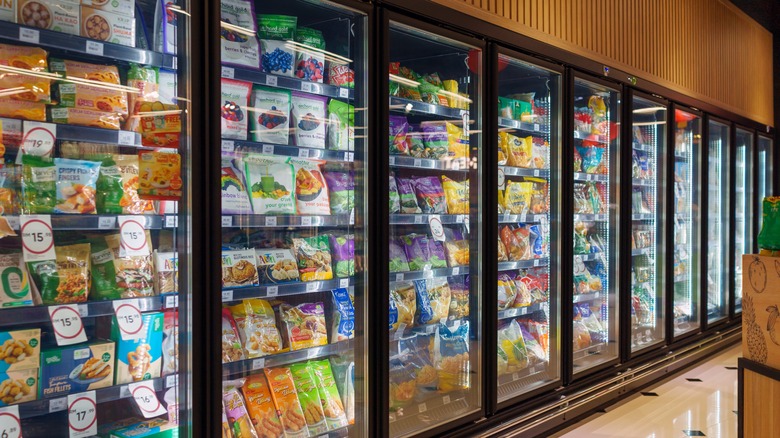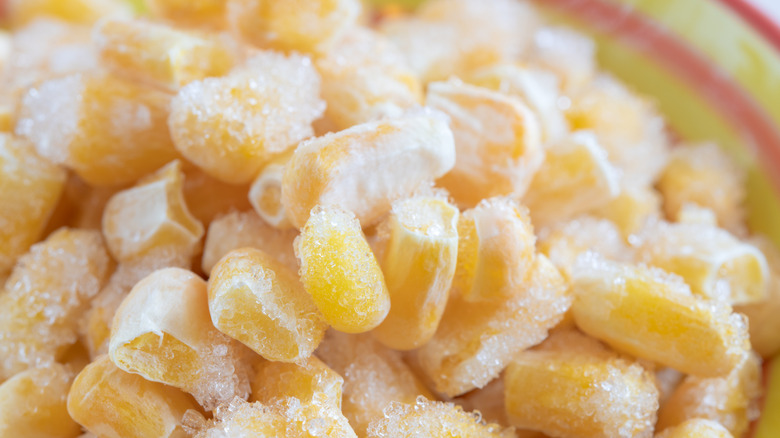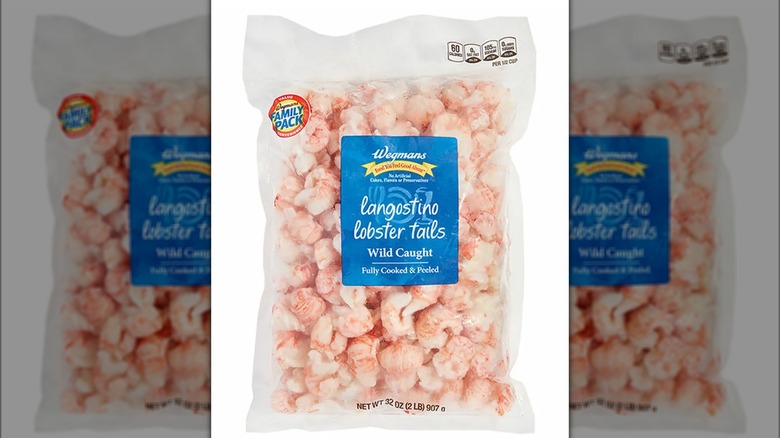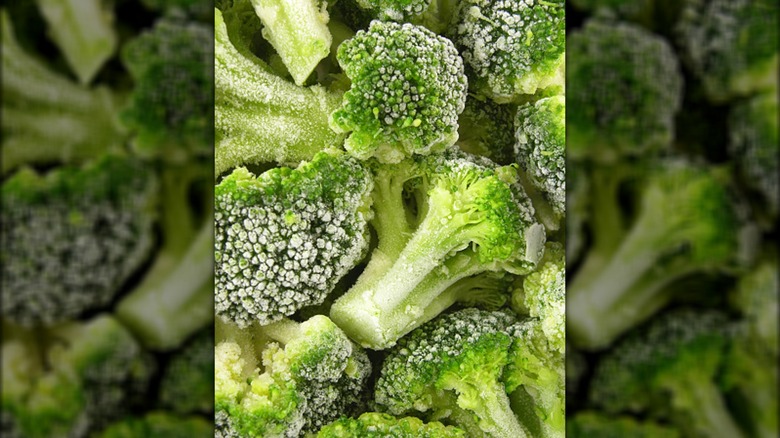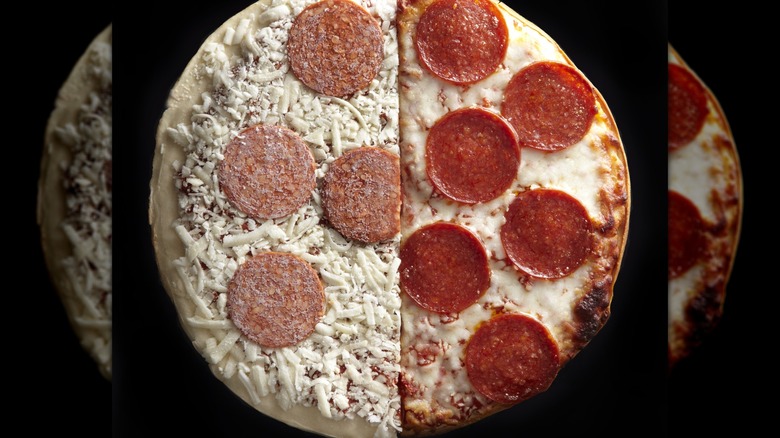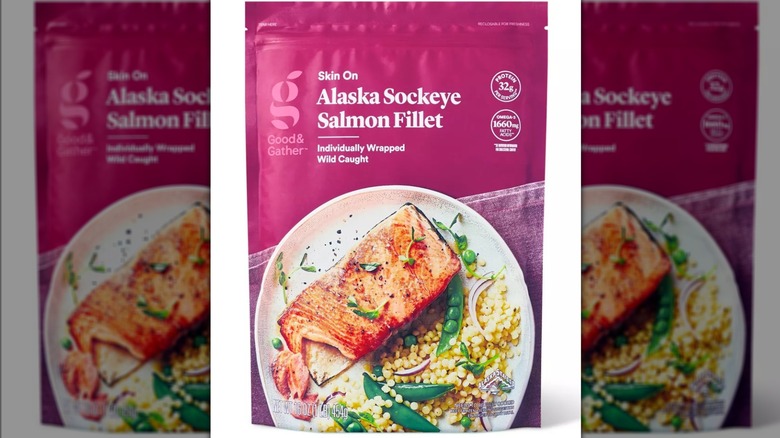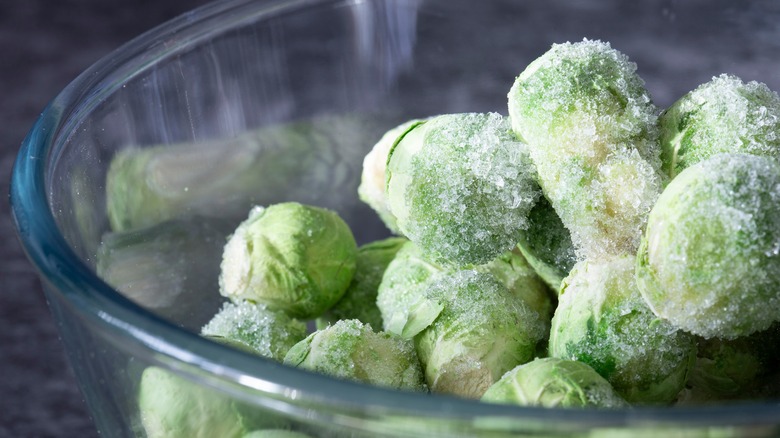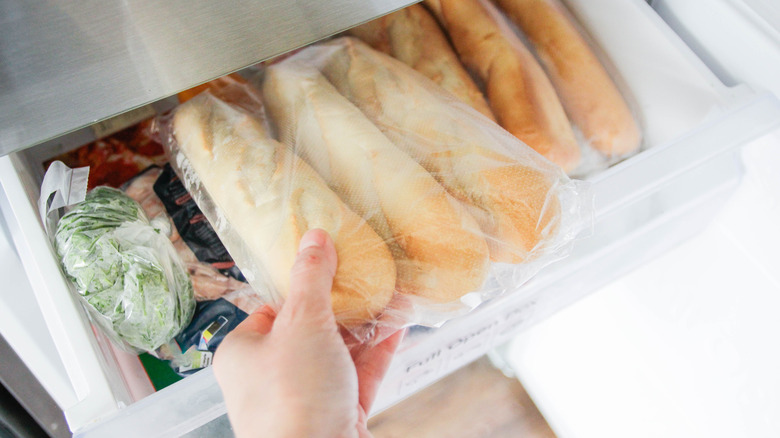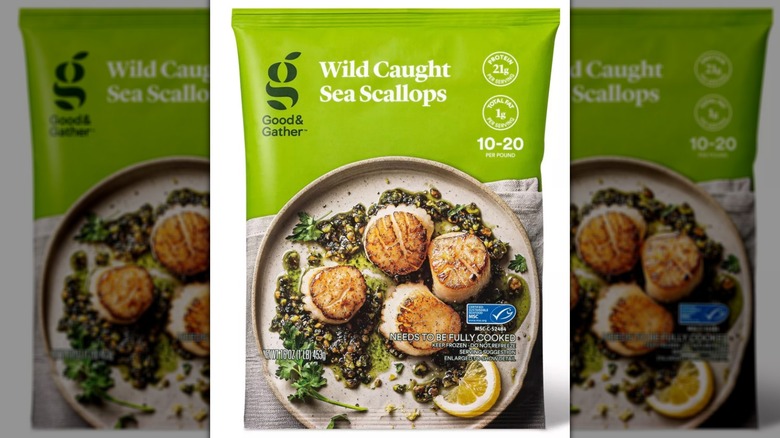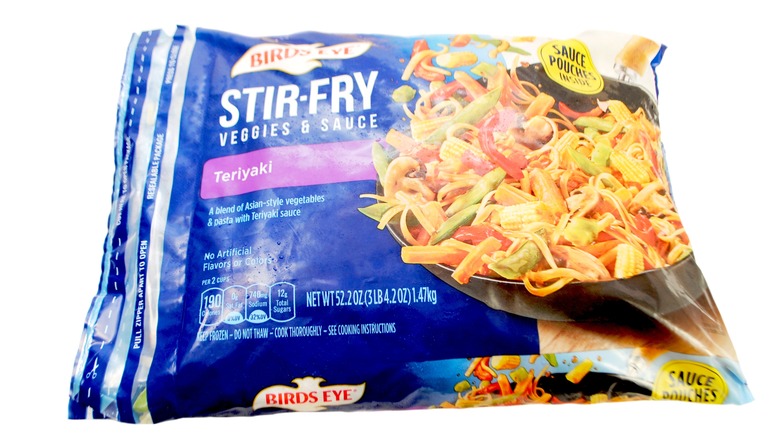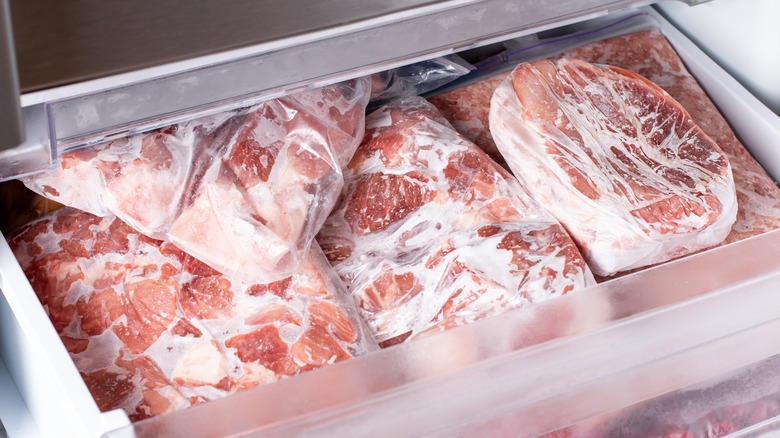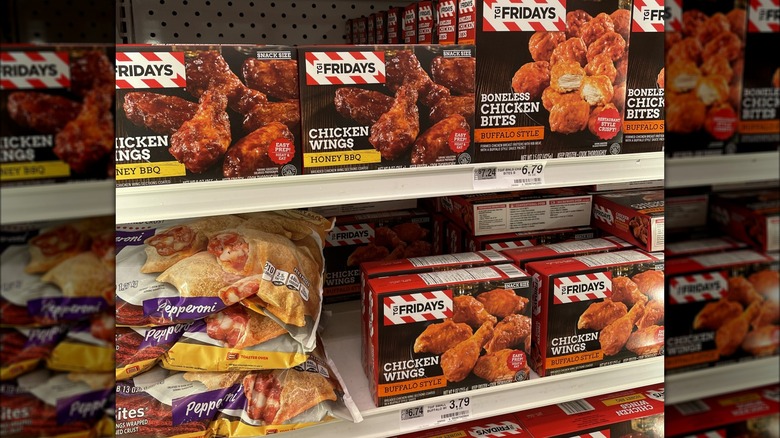13 Foods Chefs Will Never Buy Frozen
We may receive a commission on purchases made from links.
Many people love to pick up frozen foods on their regular grocery runs. With the long shelf life that comes with frozen foods plus the overall convenience, we understand why your freezer might be packed. Plus, there are some great brands and foods that are specifically made for the freezer, and sometimes those become our comfort meals.
From meats, seafood, fruits and vegetables, grains, snacks, frozen meals, and more — just about everything can be bought and stored frozen. Some restaurants even freeze certain premade items to save time. However, that's generally frowned upon — and most people expect fresh food when paying for a meal at a restaurant.
Have you ever wondered if you're missing out on great tastes or great nutrition by opting for a frozen option versus a fresh one? After speaking with a handful of chefs, we've gained a whole new insight into the world of frozen foods. These chefs told us which foods they would absolutely never buy frozen. Some, we totally see the reasoning. Others — well, let's just say, don't get in between us and our frozen pizza.
1. Corn
Corn is a popular food to find hidden in the back of almost anyone's freezer. Many of us probably have memories of our parents chucking the bag onto the counter, asking us to help heat it up in the microwave while they prepare the main meal. It's a nutritious vegetable that pairs with many different meals, and can be extremely versatile.
Although frozen corn can hold slightly more nutritional value than corn on the cob, that doesn't mean it's necessarily better. Chef Alison, owner of Ali to You Catering, shared with us that she is generally in favor of buying frozen vegetables, but corn is the exception. "Frozen corn is just flavorless watery mush. It retains very little of the prized fresh corn flavor," she said.
When you think about fresh corn, you think of that satisfying crunch that you get when chewing it. The joy of biting it straight off the cob is even better. The flavor isn't even comparable to the frozen alternative. There are also many ways to cook fresh corn — like grilling straight on the barbecue or boiling in a big pot. These methods usually leave the corn nice and plump, with the flavors deliciously intact. The microwaving or boiling of frozen corn unfortunately doesn't measure up.
2. Lobster
Who doesn't love a good lobster in the summertime? Whether you're a fan of a simple lobster tail, diving in and shucking the whole thing yourself, or prefer to eat the meat as a topping to nachos or tacos — lobster is a delicious and versatile seafood that many people adore.
Many grocery stores sell frozen lobster, like Wegmans and Acme. The great thing about frozen lobster is that it's already shucked for you, and it's quite easy to prepare. It can also be cheaper than buying fresh lobster from your local seafood market.
Chef Alison, owner of Ali to You Catering, shared with us that lobster is on her list of things she would never buy frozen. When we inquired further, she said that buying cooked frozen lobster always tends to turn out mushy. People also buy raw frozen lobster, and Alison shared that once the raw frozen lobster is cooked, it never tastes the same as when a fresh lobster is cooked.
Overall, the texture isn't maintained once a lobster is frozen. That is something that people usually love about enjoying a lobster — the tough, delectable meat that bursts with flavor. The idea of eating a mushy lobster only sounds appealing if you are making a soup. So spend the extra buck and head to your local seafood market for a fresh lobster, you won't regret it.
3. Broccoli
We've all heard by now that frozen vegetables tend to hold more nutrients than fresh ones. That is because the vegetables are usually picked and then frozen immediately, sealing in all of the nutrients. When a fresh vegetable is picked, it slowly loses its nutritional value over time.
That doesn't mean that the broccoli you're growing in your home garden or picking up fresh from the market isn't nutritious — it is. Broccoli at any stage still holds many nutritional benefits, so wouldn't you rather eat the tastiest version of broccoli possible?
According to Alexis Sicklick, Chef of Hudson Table, frozen broccoli isn't something you'd ever find in her freezer. She shared, "Frozen broccoli loses the integrity of what makes fresh broccoli so good, the crunch, its sweet grassy flavor. It becomes mushy and the flavor becomes dull as it gets waterlogged."
Another point she brought up is that no matter how you cook frozen broccoli — heating up in the microwave, boiling, or even roasting, it will never return back to the crisp and snappy texture that fresh broccoli has.
4. Pizza
Frozen pizza is one of the easiest meals to throw into the oven when you don't feel like cooking. We all know that it's not the healthiest, but sometimes you just want that easy comfort meal to indulge in. From DiGiorno to Newman's Own, there are many beloved frozen pizza brands out there to choose from.
When Chef Alison, owner of Ali to You Catering, told us that she would never be caught buying frozen pizza, we almost didn't want to listen. However, coming from a professional chef, we can understand that the quality of frozen pizza doesn't match up to a homemade pizza or one bought from a legit pizza shop.
Alison explained that the frozen pizzas are covered in sugary tomato sauce and processed cheese. Frozen pizza is almost its own genre of food, as the taste just isn't the same as a freshly made pizza pie. "It's just bad," Alison said, holding strong in her opinion.
Many frozen pizzas also have a lot of unhealthy additives and preservatives that can contribute to a weakened immune system, and even have carcinogenic properties that could cause cancer. Although pizza from your local pizza shop is still filled with unhealthy fats and possible sugars, it most likely doesn't have the unneeded preservatives, additives, or chemicals that are present in its frozen counterpart.
5. Fish
It's quite common to find a large variety of frozen fish in your local grocery store. Salmon, mahi mahi, cod, tilapia, and other fish are usually fairly affordable. It can be an easy way to make a nutritious dinner — as long as you leave time to properly defrost the fish.
The best way to defrost a frozen fish is by leaving it overnight in the refrigerator. This helps maintain the quality of the fish. The downside to that method is you need to plan ahead, and know the night before that you're wanting to cook your fish. If you didn't plan, and need to defrost quickly, you can run the package under cool water until it defrosts. That's not generally the recommended method, however, as it can reduce quality.
When talking to Alexis Sicklick, Chef of Hudson Table, she shared that frozen fish tends to get soft and mushy, especially fish with the skin on — a fillet will fall apart after cooking, or the skin will slide off. This makes it hard to sear or roast the fish properly, and will usually leave you with a less-than-ideal texture and taste. You would never go to a restaurant and be okay with receiving a soggy, watery piece of fish. If you want to enjoy the same level of restaurant-quality food, you can do so by buying your fish fresh from a local seafood market.
6. Brussels sprouts
Brussels sprouts always got a bad rap, and we're not sure why. In recent years, however, Brussels sprouts have been having their much deserved moment. They even jumped up by 47% in sales from the year 2018 to 2019. There are many great Brussels sprout recipes out there, and they can be enjoyed in many tasty ways. Just don't buy them frozen, says Chef Alexis Sicklick.
One reason why many people are turned off from Brussels sprouts is because they haven't had ones that are cooked properly. If you've ever had mushy and watery Brussels sprouts that don't have much flavor, you know what we're talking about. That's normally the outcome you'll get when cooking frozen Brussels sprouts.
Fresh Brussels sprouts, however, fry really well in the oven, air fryer, or the stove. There are amazing Brussels sprout recipes that can add completely new flavors to the vegetable — Parmesan-crusted, spicy lemon, and brown sugar soy sauce are just a few examples. The thing is, if you're working with frozen Brussels sprouts, they won't be able to get crispy enough to successfully make these recipes. Sicklick said, "I love Brussels sprouts when you can fry them so they get nice and crisp on the outside and soft on the inside. It is impossible to do that when [they're] frozen as they absorb too much water so they will just be mushy."
7. Mushrooms
Mushrooms are a great ingredient to add to a variety of dishes. Not only do they taste great, especially when cooked properly, but they also provide amazing health benefits. Mushrooms have a great source of Vitamin D, which helps with immune and bone health. They can also help with gut health, encouraging good bacteria to grow in your digestive tract.
There are many ways to incorporate them into your diet through delicious mushroom recipes. Stir-fry, pasta, omelets, ramen noodles, chicken dishes, and soups all taste amazing when mushrooms are added into them. However, are frozen mushrooms really the way to go when incorporating them into your meals?
Alexis Sicklick, Chef of Hudson Table, told us, "With mushrooms I like to cook out the natural water as much as possible to create a nice texture and concentrate the flavor. When they have even more liquid inside after being frozen, they won't hold up well long enough while cooking to cook out the water so they can caramelize and get color."
Sicklick continued to say that the texture from frozen mushrooms just won't match up to fresh mushrooms. They are meant to enhance your dishes, so you want the best possible texture to include in your meals.
8. Bread
Frozen bread can be great for people who hate when their bread goes bad too quickly. If you don't go through a loaf within a week, the chance of stumbling upon surprise mold is pretty high. Chefs, however, will scorn at the idea of ever consuming bread that was frozen.
Bread, especially fresh-baked bread, is one of the best joys in life. Nothing beats the fluffy, grain-filled taste. It's one of those foods where quality is just more important than convenience. When bread is frozen, the structure of the bread is actually changed. There are fewer starches once it's frozen, and even if you pop it in the toaster to reheat it, the starches remain the same. This can make it harder for digestive enzymes in the body to properly digest the bread.
Overall, fresh bread is the best option when you are choosing something for the taste and the nutrition content. Fresh bread is known to have a high moisture content, usually has less preservatives, and is deliciously plump.
9. Scallops
Scallops are a mild shellfish that can be flavored and cooked into many different recipes that taste great. They are also a great source of protein, vitamins, and minerals. With the health benefits and great taste to match, they're a perfect food for a delicious summertime dinner — especially if you choose to get your scallops fresh from a seafood market instead of frozen from the grocery store.
According to chefs, scallops don't cook well once they've been frozen. Scallops thaw similarly to fish – by either leaving them in the refrigerator overnight, or running cool water over them until they thaw. Along with the longer prep time, there are other downsides to cooking frozen scallops. When they're frozen, they absorb more water. Excess water in scallops prevents them from browning, which could result in mushy scallops that don't take on flavor well.
Most seafood is better fresh, which is why fresh seafood markets (in coastal towns, that is) are still incredibly popular. People wouldn't be spending extra money on fresh seafood if it wasn't better than the frozen alternatives they can get at the grocery store.
10. Frozen vegetables with sauce
Anything with frozen sauce or dressing probably isn't the healthiest — mainly because of extra ingredients like preservatives and sodium that aren't needed. Many people end up buying these items to save time, since they are easy to prepare and need little brain power to whip up an easy meal or side dish.
Jessica Randhawa, owner and head chef of The Forked Spoon, shared with us that she would never have frozen vegetables with sauce in her freezer. Along with the health concerns, she said, "The texture of these vegetables can become quite soggy once thawed and reheated, which detracts from the fresh, crisp quality I enjoy in salads and stir-fry dishes."
Many stores like Trader Joe's and Wegmans offer varieties of veggies with interesting sauces, and they seem very enticing by the packaging. Always check the nutritional information to make sure that you're not ruining your vegetable intake by adding tons of sodium and other unnecessary ingredients. Instead, pick up some fresh vegetables and make your own seasoning or sauce at home. It'll taste better, and be better for you.
11. Beef
When you're selecting beef — whether it be ground beef, steak, or burger meat — it's always best to get it fresh than frozen. There's a reason why restaurants like Texas Roadhouse and Longhorn Steakhouse never freeze their meat. Fresh meat is known to be a higher quality of taste and texture, and people tend to gravitate toward establishments that sell fresh meat.
Frozen cuts of beef don't marinate as well as fresh cuts, and the prep time is actually longer than if you choose to go with the frozen option. First, you must defrost the meat safely – not doing so can cause bacteria to grow. Beef can be defrosted by putting it in the refrigerator overnight, running it over cold water, or thawing it in the microwave. You can also cook beef straight from the freezer, but you won't be able to properly season the meat beforehand.
Jessica Randhawa, owner and head chef of The Forked Spoon, said, "The freezing process can affect the [steak's] texture and moisture content. When steak is frozen, the water inside the muscle fibers expands and can rupture the fibers, leading to a loss of moisture when cooked. This often results in a steak that's less juicy and tender than a fresh one." With fresh beef, you can simply pick it up from the butcher, season, and get cooking! It's also a plus to be able to head to the butcher yourself and choose your own cut of beef.
12. Frozen appetizers
Frozen appetizers can seem so enticing when strolling through the frozen food aisle. There are so many options, and many come from restaurant brands like TGI Fridays and Hooters. From chicken tenders to crab cakes to empanadas and more, there are many options in the frozen appetizer aisle. For Chef Alison, owner of Ali to You Catering, says you'd never catch her picking up one of those boxes in the store.
She shared with us that these foods tend to be extremely high in calories, hold little beneficial nutritional value, and always end up tasting disappointing. She does acknowledge that making your own appetizers can be time-consuming and requires some cooking skill — but it's worth it.
If you're inspired and want to cook your own appetizers, check out this article with 98 appetizer recipes. Making your own food can be empowering, tastier, and healthier. So ditch those boxed appetizers and make some yourself! Your guests will thank you.
13. Cream-based soups
Buying soup in a can or frozen is incredibly common — and is fine for certain types of soup. However, we all know that there's nothing like making your own fresh soup to gobble down on a cold day. Especially when it comes to creamy soups, like butternut squash, cream of mushroom, or chicken gnocchi soup, it will be much better quality if you make it or at least buy it fresh.
Jessica Randhawa, owner and head chef of The Forked Spoon, shared that she will never buy frozen cream-based soups. She said, "The freezing process tends to break the emulsion of cream and broth, resulting in a separated, grainy texture once reheated. I find that making cream soups fresh allows me to control the quality and achieve a smooth, velvety consistency that just doesn't come out right with frozen varieties."
The last thing you'd want is for your creamy soup to have an inconsistent texture and grainy finish. That defeats the whole purpose of the word creamy! If you enjoy cooking, try making your next soup craving from scratch, like this creamy roasted garlic soup recipe. You'll end up with a much more satisfying meal than if you'd bought something similar frozen.
